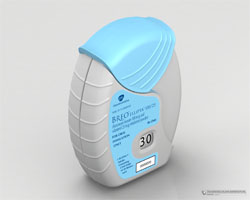When GlaxoSmithKline ($GSK) launched Breo--a respiratory med headed for blockbuster territory, analysts say--media reports buzzed over the company's emphasis on the treatment's risks. After all, it was only July 2012 when the pharma giant forked over $3 billion in the largest-ever off-label marketing settlement, in part for pushing Breo predecessor Advair for all asthma cases when it was only intended for those most severe.
 |
| Courtesy of GlaxoSmithKline |
But as GSK spokesman Juan Carlos Molina told FiercePharmaMarketing, hammering home risks--as well as benefits--is not necessarily something new for Glaxo. What has changed is the conversations reps are having with doctors, thanks to the "Patient First" model that ended individual sales quotas for U.S. reps in 2011 and left some competitors skeptical. Now, with another potential respiratory star on the way, the overhauled sales model will be getting its fair share of action.
That to-be-launched drug, Anoro, won FDA approval in December and received a recommendation for EU approval late last week. It and Breo are the linchpins of GSK's new respiratory strategy. "Since Anoro will be such an important addition to our portfolio, we'll be working really diligently to make sure our customers are educated on the product profile and the appropriate patient for it," Molina said in a phone interview.
According to Molina, the "Patient First" plan focuses conversations between field reps and physicians on their patients, their needs, and their knowledge of Glaxo's products, including identifying the right patients for any given drug. The approach reflects not only different training and incentives for sales reps but also the market's increased emphasis on health outcomes.
As payers have recently shown, Glaxo's point is an important one for pharma's consideration. The ability to exclude drugs from their national formularies has payers wielding more power than ever, and drugmakers that can show beneficial outcomes for their drugs are getting the edge. Glaxo itself saw Express Scripts ($ESRX) bar Advair from its new national formulary in favor of AstraZeneca's ($AZN) Symbicort and Merck's ($MRK) Dulera.
With the company still gearing up for Anoro's launch, Molina says it's too early to go into specifics. But he did say the "Patient First" approach would play a big role, providing the type of "space for some really valuable interaction with our customers" that has so far been well-received.
That's not to say the model hasn't had its critics. Some have questioned how Glaxo reps would fare in competition with those still motivated by volume-based incentives. Others have suggested that the new measures, in attempting to curb the use of unethical practices, may curb the performance of successful sales reps who never used unethical practices in the first place.
But in addressing the skepticism, Molina pointed to U.S. sales growth since the company implemented the changes. In 2012, the first full year using the new model, U.S. sales of pharmaceuticals and vaccines came out flat, excluding the impact of controversial diabetes med Avandia. In 2013, those sales grew 4%.
"I think we feel confident that we can keep up," he said. "In fact, in terms of leading with our values, it's really a differentiator and sets us apart."
Special Report: Pharma's Top 11 Marketing Settlements - GlaxoSmithKline - Paxil, Wellbutrin, Avandia